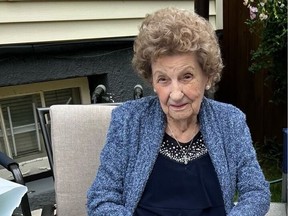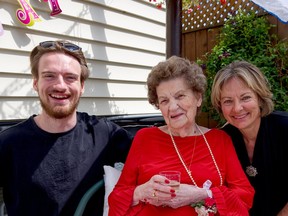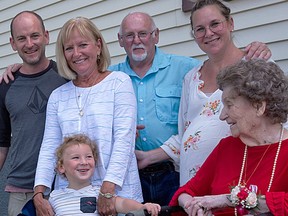She was treated appallingly in her final hours. And we learned there is no place in our bureaucratic public health care system for vulnerable, elderly patients.
Published Mar 06, 2024 • Last updated 1 hour ago • 5 minute read
 Mary-Jane McCarthy is shown on her 102nd birthday, Aug. 15, 2023. She had been living in her own house, and her mind was sharp as a tack. Photo by Family photo
Mary-Jane McCarthy is shown on her 102nd birthday, Aug. 15, 2023. She had been living in her own house, and her mind was sharp as a tack. Photo by Family photo
The following was written in response to The Fall: My once-vibrant dad emerged broken from the hospital. Then he was gone, published Feb. 16.
***
Article content
“The minute my father entered the hospital, the clock began to tick … ”
That line in Elizabeth Payne’s recently published article took me back to my own painful experience — one I’d just as soon forget, but feel compelled to share in the hope of shedding more light on the tragic effects of the health-care crisis on elderly people.
Advertisement 2
This advertisement has not loaded yet, but your article continues below.
THIS CONTENT IS RESERVED FOR SUBSCRIBERS ONLY
Subscribe now to read the latest news in your city and across Canada.
Exclusive articles from Elizabeth Payne, David Pugliese, Andrew Duffy, Bruce Deachman and others. Plus, food reviews and event listings in the weekly newsletter, Ottawa, Out of Office.Unlimited online access to Ottawa Citizen and 15 news sites with one account.Ottawa Citizen ePaper, an electronic replica of the print edition to view on any device, share and comment on.Daily puzzles, including the New York Times Crossword.Support local journalism.
SUBSCRIBE TO UNLOCK MORE ARTICLES
Subscribe now to read the latest news in your city and across Canada.
Exclusive articles from Elizabeth Payne, David Pugliese, Andrew Duffy, Bruce Deachman and others. Plus, food reviews and event listings in the weekly newsletter, Ottawa, Out of Office.Unlimited online access to Ottawa Citizen and 15 news sites with one account.Ottawa Citizen ePaper, an electronic replica of the print edition to view on any device, share and comment on.Daily puzzles, including the New York Times Crossword.Support local journalism.
REGISTER / SIGN IN TO UNLOCK MORE ARTICLES
Create an account or sign in to continue with your reading experience.
Access articles from across Canada with one account.Share your thoughts and join the conversation in the comments.Enjoy additional articles per month.Get email updates from your favourite authors.
Sign In or Create an Account
or
Article content
My mother died Dec. 27 in a cluttered, noisy room of a bustling hospital floor at the age of 102. She was alone.
Hours earlier, she had been rushed out of one crowded room to a similar one a few floors below. The moving crew came bursting in with bags in which to stuff her personal items just moments after the nurse informed me she had to be moved.
One moment I was doing my best to comfort her and block out the hollering from the next bed, the next she was whisked out of the room and down the hall as I scrambled along behind her bed. My pleas to the head nurse about my dying mother were met with a shrug and a mumble about a “call from downstairs needing the bed.”
It was an appalling way to be treated in her final hours. But only the latest in a series of indignities that my sisters and brother and I had come to expect since my mother was admitted to the hospital a month earlier.
Mom had lived an amazing life for her 102 years. She was in her own house and managed well with some help. She ate well, got limited exercise, kept up on the news, socialized regularly with her many children, grandchildren and great grandchildren. Her mind was as sharp as a tack.
Advertisement 3
This advertisement has not loaded yet, but your article continues below.
Article content
She began to use a walker a couple of years ago, so getting out and about was difficult for her. My sisters and brother began tending to groceries, housekeeping and some cooking, though she was still getting herself some evening meals until recently. About two months ago, she woke up confused and her vision was blurred. The confusion soon subsided but the blurry vision remained. A doctor’s appointment days later revealed that she’d had a minor stroke. Because of her hampered vision, my sisters and I began to spend nights with her for fear of a fall.
 Mary-Jane McCarthy with grandson Timothy Hodges and daughter Michelle Walsh at her 100th birthday party. Photo by Derik Hodgson
Mary-Jane McCarthy with grandson Timothy Hodges and daughter Michelle Walsh at her 100th birthday party. Photo by Derik Hodgson
In late November, she again woke up confused. An ambulance took her to the local hospital.
She spent three days in the emergency department. Three days! Despite her age, or more likely because of it, she was assigned to a hallway and a supply closet — triaged as a dying old lady. Back of the line for her.
When finally seen by a doctor, she was admitted with a Urinary Tract Infection. No signs of a stroke, they said. A UTI. Fully treatable, one would think, with the right antibiotics and one doctor who would take the time to look at her, listen to her family, and most importantly, follow up!
Advertisement 4
This advertisement has not loaded yet, but your article continues below.
Article content
Not to be.
What they have now in hospitals are “teams.” You don’t have just one doctor, you have a whole team looking after you. What could go wrong?
My mom’s “team” had a series of revolving doctors and other staff — dieticians, social workers, physiotherapists, community care workers — though we rarely saw the same member twice. Anytime an actual doctor visited — and they often bypassed her room unless a specific request had been made through the nurse — they mostly stared into a binder. Rarely did they really look at her and spend any amount of time trying to figure out if her UTI had been successfully treated or how to get her nourished, moving, engaged and back home. Repeated requests for a private room fell on deaf ears and after almost a month we gave up asking.
I foolishly hoped that maybe the sudden move in her last hours was because someone had woken up to the fact that privacy might be important at a time like this.
Yet again, not to be.
In emergency for so long, mom became completely bewildered. As someone whose hospital stays had been limited for the most part to the births of her children, she felt lost and afraid in this new reality. The decline began. And because of neglect, it continued steadily over the days and weeks.
Advertisement 5
This advertisement has not loaded yet, but your article continues below.
Article content
All of this muddled care resulted in my mother not getting her most basic needs met right from the start. She was undernourished and dehydrated when she finally got into a bed. We managed to get her on IV fluids, which seemed to charge her batteries enough to begin eating a little better. But the IV was discontinued with the change of staff.
Another doctor ordered two extra-strength Tylenol four times a day for pain. This despite her consistently saying, when she could still communicate effectively, that she was not in pain, just weak. And obviously undernourished. Nevertheless, on more than one occasion I came in the morning to find her extremely groggy. Not able to wake up. The Tylenol was clearly being administered anyway. She was dropping weight rapidly. Hovering near 100 lbs, with potentially eight extra-strength Tylenol in her system daily, what chance did she now have? Though she tried very hard to continue getting out of bed and walking a bit with help, there came a point when she was just too weak and drugged up.
Our earlier hopes to get her into a rehabilitation facility were dashed because she did not meet the prerequisite of participating in her own rehab. We made the heartbreaking decision to seek palliative care, thinking things couldn’t get worse. But they did.
Advertisement 6
This advertisement has not loaded yet, but your article continues below.
Article content
The “team’s goal” at this point, we were told at a meeting with the family, was to discharge my mother. So far out of touch were they that retirement homes with assisted living were being suggested.
We quickly found a palliative care home, but were told she was not enough of a priority — back of the line again.
Perhaps the poor communication and lack of commitment to the elderly can be explained by strained hospital resources, and maybe the lack of compassion is some kind of defence mechanism by stressed-out staff.
But my mother’s last month of life was a nightmare because there is no place in our bureaucratic bungle of public health care for vulnerable, elderly patients. The back of the line at their age means almost certain death.
Michelle Walsh lives in Ottawa.
 Adults, standing, left to right: Kyle Laverty (grandson), Jacqueline Laverty (daughter), Pat Laverty (son-in-law), Kim Laverty (granddaughter). In the front, Silas Barr(great grandson)and Mary-Jane McCarthy, in red, exchange smiles. The occasion was the celebration of McCarthy’s 100th birthday. Photo by Derik Hodgson /ott
Adults, standing, left to right: Kyle Laverty (grandson), Jacqueline Laverty (daughter), Pat Laverty (son-in-law), Kim Laverty (granddaughter). In the front, Silas Barr(great grandson)and Mary-Jane McCarthy, in red, exchange smiles. The occasion was the celebration of McCarthy’s 100th birthday. Photo by Derik Hodgson /ott
Recommended from Editorial

Today’s letters: We need to better understand the health needs of older people

Spindel: Elders are not the problem — Ontario’s bad public policy is
Article content
>>> Read full article>>>
Copyright for syndicated content belongs to the linked Source : OttawaCitizen – https://ottawacitizen.com/opinion/walsh-a-bungled-health-care-system-a-mothers-death










